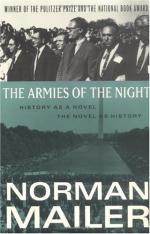
|
| Name: _________________________ | Period: ___________________ |
This test consists of 5 short answer questions, 10 short essay questions, and 1 (of 3) essay topics.
Short Answer Questions
1. Why does Mailer's conversation with Macdonald become awkward in Chapter 4?
2. In Chapter 2, what does Mailer agree to do the protest?
3. With whom does Mailer get into a shouting matching in Chapter 6?
4. Which of the following men is not quoted by Mailer is having advocated sensory adjudication in Chapter 2?
5. Who is William Sloane Coffin?
Short Essay Questions
1. Why are Mailer, Macdonald, and Lowell ambivalent about getting arrested in Chapter 1?
2. What does Mailer feel about left-wing splinter groups' names in Chapter 3?
3. Why does Mailer agree to join the Pentagon protest in Chapter 2?
4. What reasoning does Mailer give for placing himself at the center of the narrative of the novel in Chapter 1?
5. What metaphor does Mailer use in Chapter 5 to describe the Vietnam controvery in America and who takes what sides?
6. What happens once the group arrives at the Justice Department in Chapter 4?
7. How do Ed de Grazia and Mailer scuffle in Chapter 5?
8. How does Norman Mailer characterize his hangover in Chapter 2?
9. What does Mailer pointedly note about the black delegates at the march in Chapter 3?
10. Describe the interactions Mailer has with his fellow speakers at the party in Chapter 4.
Essay Topics
Write an essay for ONE of the following topics:
Essay Topic 1
Norman Mailer, the author of Armies of the Night, takes on several roles throughout the novel. He is protagonist, author, and historian at the same time. Write an essay about the interchange amongst these three Mailers, divided into three parts:
Part 1) Norman Mailer is the protagonist of the novel, but the narrator's relationship to him is not as intimate as one might expect. Explore how the point of view of the novel makes the character of Mailer as much object as subject. What aspects of the character does the narrator go to great pains to dissect? How does the he function as protagonist to the first book?
Part 2) Discuss the role of Mailer as narrator in the first book of the novel. What does his narration reflect about the author's personality and his relative level of sobriety? Would you say that Mailer the author is a reliable narrator? How does he react both to the events of the march and the actions of Mailer the character?
Part 3) Focus on Mailer's narration in the second book on the novel. He characterizes himself as a historian in this section. How is Mailer the narrator different from both Mailer the author and Mailer the character? Is his narration more or less reliable than it was in Book I? In what way do the two narrators meet at the beginning of Book II?
Essay Topic 2
Write an essay about the consistent comparison of the marchers in the novel to a conventional army. Begin your discussion of this likening of two armies by focusing on Mailer's connection of the march to his tour of duty in World War II. What are the similarities he mentions? Where is the comparable glory and agony experienced by both groups? How do the marchers have to prove their courage and willingness to sacrifice for comrades? How does this affect the wording used in describing them?
Essay Topic 3
Near the end of the second book, Mailer enumerates the reasons why some people oppose the war in Vietnam. Write an essay about this logic, focusing on three of the groups he mentions. Do you think their reasoning in sound? What organizations and individuals represent this group in the narrative? Are there modern parallels to this group in today's society?
Part 1) Those who want Asia and, eventually, America to turn Communist.
Part 2) Those who are pacifists.
Part 3) Those who think the war is unjust.
|
This section contains 1,269 words (approx. 5 pages at 300 words per page) |

|




